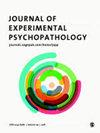The forgotten affective route of social cognition in patients with bipolar disorders
IF 1.9
4区 医学
Q4 PSYCHIATRY
引用次数: 1
Abstract
Social cognition (SC) research in bipolar disorders (BD) has provided evidence about deficits in different phases of the illness. Most of the studies have focused on two aspects of SC: theory of mind and emotion recognition. However, according to influential models of social neuroscience, two aspects of understanding others need to be distinguished: the cognitive (theory of mind and emotion recognition) and the affective route (empathy and compassion) of SC. We aimed to determine whether individuals with BD significantly differ from healthy controls on measures of the affective route of SC according to the available evidence. We conduct a narrative review of original research based on a social neuroscience model of SC. BD is associated with alterations of the affective route of SC during acute episodes and remission. During mania and subthreshold depression, an increase in empathy (“over-empathizing”) and discomfort (empathy) has been reported, respectively. A pattern of high empathic distress and low compassion appears during remission. This article is the first to review the evidence on the affective route of SC in BD, revealing trait and state alterations. We emphasize the need to consider this affective dimension of SC in future research, to design more specific interventions in BD patients.双相情感障碍患者被遗忘的社会认知情感途径
双相情感障碍(BD)的社会认知(SC)研究为疾病不同阶段的缺陷提供了证据。大多数研究都集中在SC的两个方面:心理理论和情绪识别。然而,根据有影响力的社会神经科学模型,理解他人的两个方面需要区分:SC的认知(心理和情感识别理论)和情感途径(移情和同情)。根据现有证据,我们旨在确定BD患者在SC情感途径的测量方面是否与健康对照组存在显著差异。我们对基于SC社会神经科学模型的原始研究进行了叙述性综述。BD与SC急性发作和缓解期间情感途径的改变有关。在躁狂和阈下抑郁症期间,移情(“过度移情”)和不适(移情)分别增加。在病情缓解期间,会出现高移情痛苦和低同情的模式。本文首次回顾了BD中SC情感途径的证据,揭示了特质和状态的改变。我们强调,在未来的研究中,有必要考虑SC的这种情感维度,以设计对BD患者更具体的干预措施。
本文章由计算机程序翻译,如有差异,请以英文原文为准。
求助全文
约1分钟内获得全文
求助全文
来源期刊

Journal of Experimental Psychopathology
Medicine-Psychiatry and Mental Health
CiteScore
2.00
自引率
0.00%
发文量
19
审稿时长
11 weeks
期刊介绍:
The Journal of Experimental Psychopathology (EPP) is an open access, peer reviewed, journal focused on publishing cutting-edge original contributions to scientific knowledge in the general area of psychopathology. Although there will be an emphasis on publishing research which has adopted an experimental approach to describing and understanding psychopathology, the journal will also welcome submissions that make significant contributions to knowledge using other empirical methods such as correlational designs, meta-analyses, epidemiological and prospective approaches, and single-case experiments.
 求助内容:
求助内容: 应助结果提醒方式:
应助结果提醒方式:


